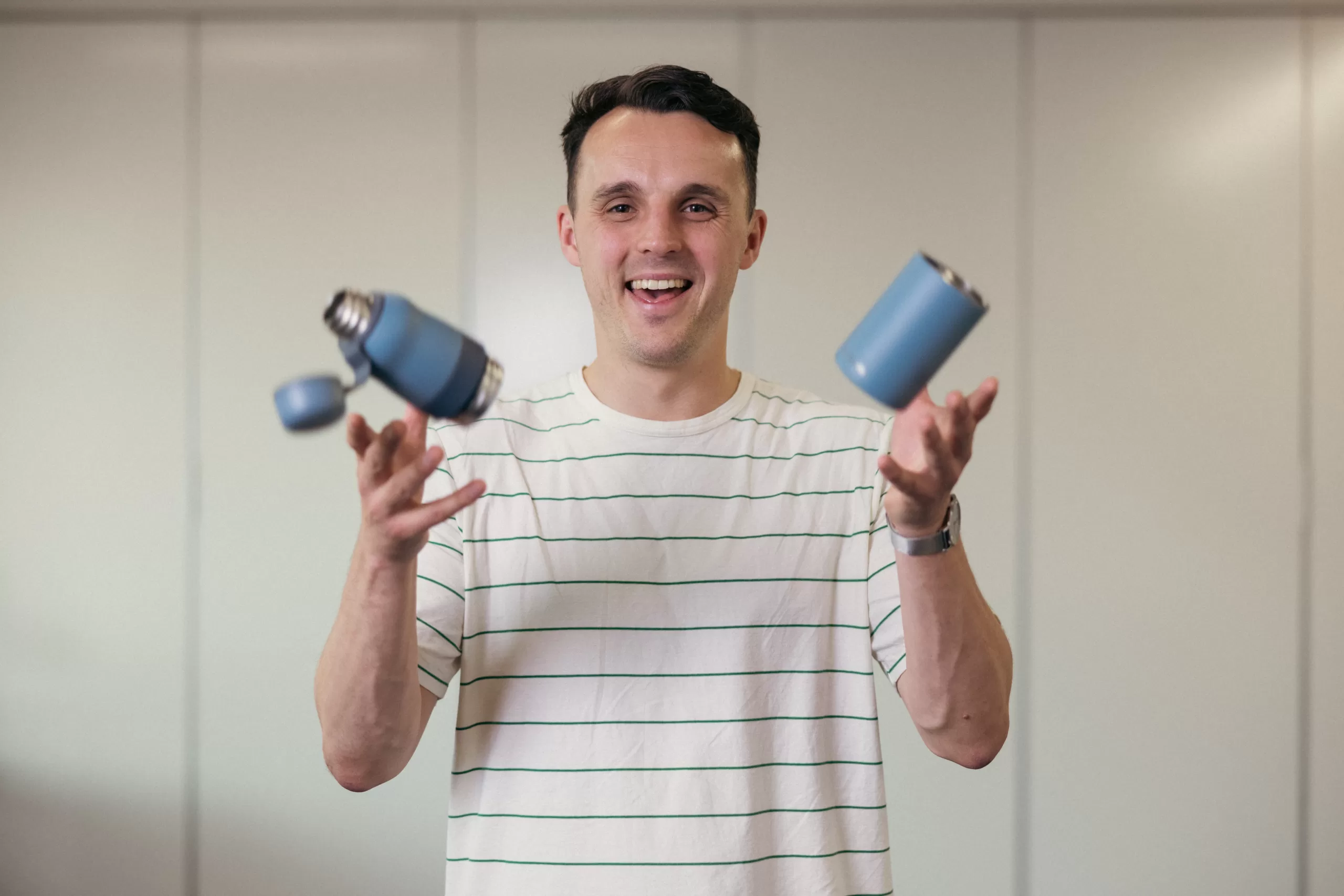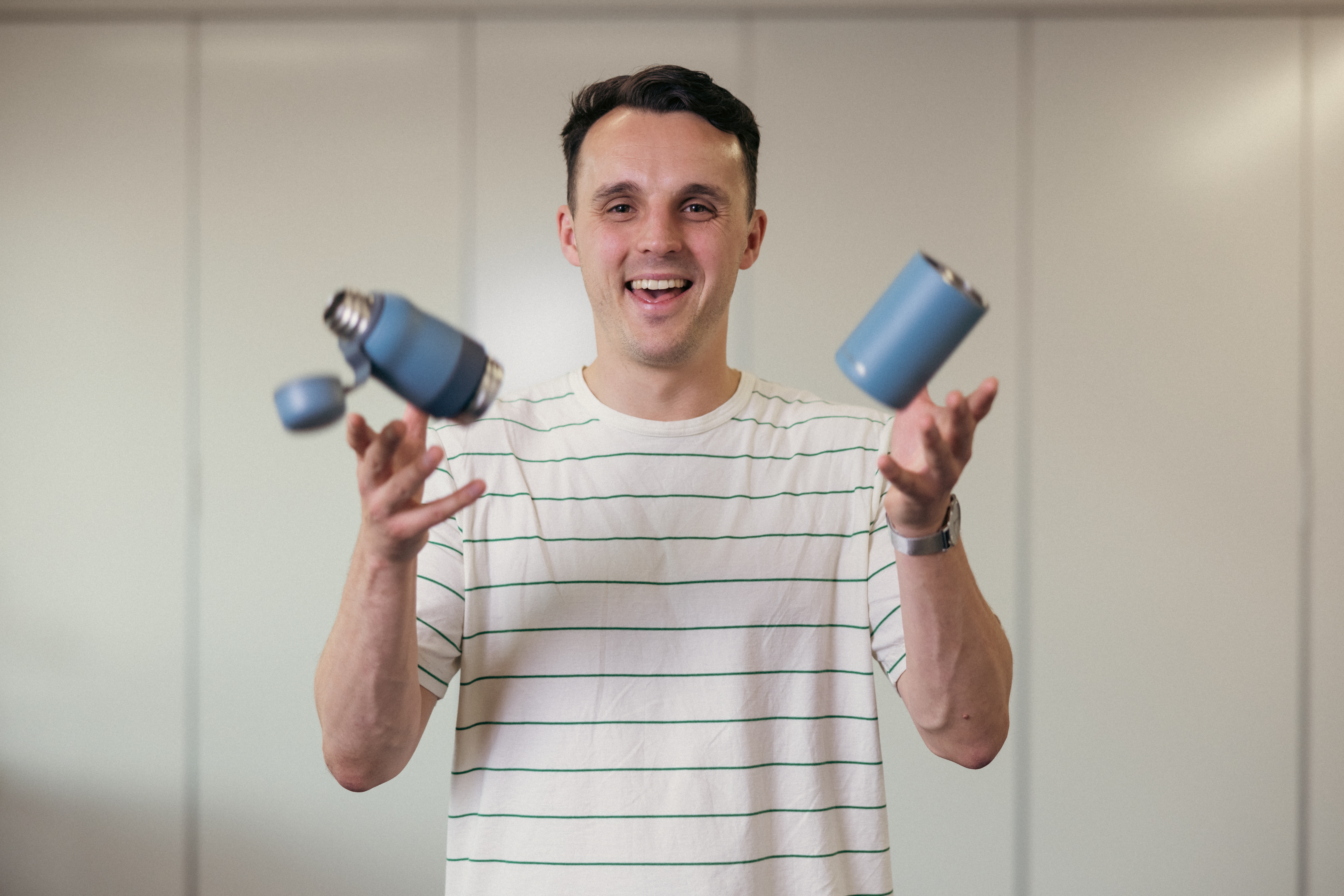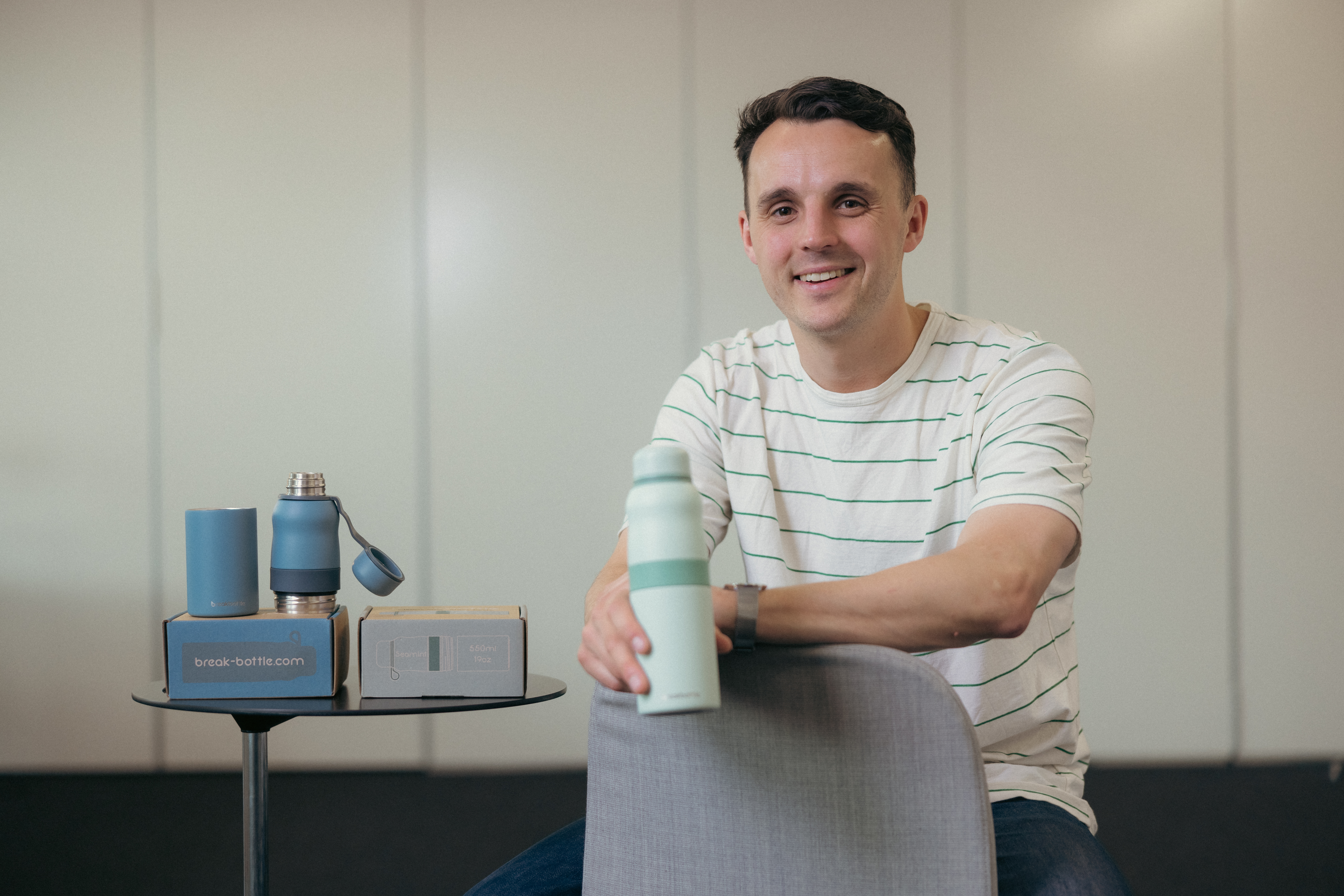Jonny Cottom quit his full-time job and left his London flat to move back home with his parents in St Helens, Merseyside, as he sunk his £15,000 savings and even his grandmother’s inheritance into his idea.
The 30-year-old accountant spent months beavering away in his brother’s old bedroom as his mum kept him nourished with crumpets.
A fledgling entrepreneur, he became very protective of his idea.
“Quite a common thing for early entrepreneurs is that you are very protective of your idea, and you’re thinking this is an amazing idea, I can’t tell anyone because they’ll run away and steal it,” he told The Sun.
“Really, I should have shared it way sooner.”
Jonny’s company Breakbottle sells insulated and sustainable water bottles which ‘break’ in the middle so they can be cleaned more hygienically.
It is now bringing in an estimated £70,000 a year.
‘EUREKA MOMENT’
He said he had a “Eureka moment” after continuously having to wash his reusable water bottles due to the horrible bacteria smell that is difficult to clean.
“I was trying to go to work and was in a rush, but my bottle smelled from the night before,” he said.
“I put some washing up liquid in the top, and then I was shaking it next to my head.”
Jonny said this “bizarre cleaning ritual” made him wonder if there was potential for a new product.
The University of Manchester graduate began to develop his idea further over time in the evenings after long days in the office.
“I was doing a really busy job anyway and there were times I would do my job, have some food, put a few hours in on the side hustle, go to bed, start again,” he said.
He was living with three friends from university in a flat share at the time.
“A lot of the time I was in my bedroom… it wasn’t massive, just enough room for a bed and a desk.
“Other times I’d be in the kitchen and that’s the first my flatmates saw of it. Me with these weird little drawings.
“They’d be like ‘what are you doing?'”
With time and resources often scarce, Jonny would budget aggressively, bulk cooking for the week so that he could often grab food on the go.
He eventually moved back home, where he initially continued working for the accountancy firm remotely while saving as much money as he could and putting his efforts into the venture.
The prospect of returning to St Helens was daunting, but it had plenty of unexpected perks.
He explained: “I did feel a bit strange. I absolutely love my mum and dad, I’ve got a great relationship with them but I didn’t necessarily want to live at home. It was a means to an end.
I was doing a really busy job anyway and there were times I would do my job, have some food, put a few hours in on the side hustle, go to bed, start again.
Jonny Cottom
“The novelty wore off after a bit and I did just feel I need to get on with my life,” he said laughing.
However, his parents were very excited and supportive in the eight months he was back living with them, partly during Covid lockdowns.
“My dad and his dad had their own food manufacturing business, making pies and sausages and stuff,” explained Jonny.
“They both were really into it and asking lots of questions, enthused about how it all worked, especially digital marketing. It was nice to have people to bounce ideas off.”
He went on to say: “I worked in my brother’s old bedroom because he wasn’t there. I was either downstairs in the kitchen or I was in the bedroom.”
He said his mum, who is retired, ensured he was getting plenty to eat.
“It was a lot of crumpets. That part was quite nice,” he said.
And she was good at letting him know he was working too much.
Seven steps to a successful start-up
Successful entrepreneur and CBE Emma Jones started Enterprise Nation in 2005 to support the growing number of people starting businesses.
Today the small business support platform and membership community helps 800,000 firms a year.
The Sun asked her to share her top tips for would-be business owners.
And you don’t have to go all in straight away either.
Emma says: “Around 45% of all businesses are now started as a side-hustle, where people are holding down full or part-time employment and working on the business in the evenings and at weekends.
“It means you can test the idea first without having to take a salary in the early stages and invest profits back into the business.
“Don’t give up your day job – at least not straight away. ”
Building a business can be hard work too – but can be worth it.
“Running your own business is so rewarding but it takes a lot of hard work and effort – but it’s brilliant to see the fruits of you labour come to fruition,” Emma says.
“But enjoy it! There’s nothing like the buzz you get from hitting targets and making sales.”
Test your idea
Write a business plan and set a budget
Learn how – and start selling
Get paid
Upskill
Network Find investment
Click here to see Emma’s advice in full
“She’d say ‘come and relax for bit, just leave it for a while.'”
He continued: “Managing other people’s expectations is a big part of it because not everyone always understands. Weirdly when it’s your job and you’re working late people get it but when it’s your own thing.”
Jonny also had to sacrifice his personal life too.
“There was one weekend where there was three events I should have been at,” he recalled.
“There was a festival, a mate’s birthday and something else. I remember that day I was sat at home at my mum and dad’s, checked on social media and saw everyone having fun. I didn’t look at my phone for the rest of the day,” he said laughing.
“It was tough because it was self-inflicted.”
Despite months of isolation and navigating the murky waters of marketing, design and other business admin he had no clue about, he eventually realised opening up was a key step.
Jonny said rather than simply protecting your idea, “building in public” can mean you get a host of constructive feedback, and it was certainly when he realised “there’s actually something here”.
He eventually secured grants, including from Innovate UK, and business loans.
But he faced constant hurdles, regardless, ploughing funds into the wrong areas – including all of his own money invested quickly disappearing in various rounds of product testing.
“Some of the stuff I was pushing out to begin with was so rubbish, I just didn’t have the manpower or the money to bring in an expert,” he admitted.
QUITTING HIS JOB
Despite all the hard work, towards the end of 2021, Jonny came to a “make or break moment” which saw him finally quit his accountancy job to focus full time on the side hustle.
“I knew I needed pre-orders to fund the first production run and to check we had paying customers before going any further – so I decided to quit and take the plunge.”
He was launching a crowdfunding campaign and knew he needed completed designs, video and other easily available information that could attract people to put in orders.
It worked, because he raised £40,000 in 30 days.
Fast forward to today and the firm is raking in tens of thousands a year.
Jonny has since also begun working part-time in accounting and finance but “purely for start-ups”, and has returned to London to live with his girlfriend.
He currently only pays himself a few hundred pounds a month through Breakbottle as the company continues to grow.
He is also looking at bringing in a co-founder with experience outside of his own to help push the business further.
Jonny was able to utilise Sage for accounting, which allowed for a streamlining of everything on the financial side of things.
Sage Accounting Individual for sole traders is available on web and mobile, launched to help simplify self employed finances and taxes – making it ideal for those running side hustles.
Andreas Georgiou, VP Product Marketing, Small Business from Sage said: “As well as growing single side hustles, we’re seeing more people using tech to combine income from multiple side hustles to effectively create full-time jobs.
“As we introduce Sage Accounting Individual, we’re here to celebrate these journeys and provide much-needed support in an ever-changing market.
“The digital record keeping software is for sole traders and self-employed professionals who need to manage their income and expenses to complete their annual Self Assessment tax return, as well as helping with overall productivity.”




